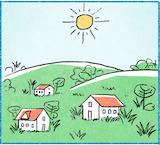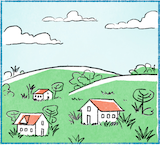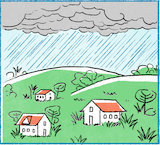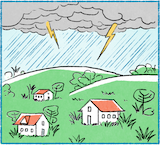



นี้คืออี่หยัง นี้คืออากาดญามมื้อเว็น
อากาดญามมื้อเว็นเป็นแบบใด อากาดญามมื้อเว็นมันสิแก่งจ่างป่าง
มันสิมีตะเว็นบ่ มีอยู่ ท้องฟ้าญามมื้อเว็นมันสิมีตะเว็นพ้อม
ตะเว็นสีอี่หยัง ตะเว็นสีเหลียง
ตะเว็นน่วยใหญ่บ่ ใหญ่อยู่ ตะเว็นน่วยบักใหญ่
ท้องฟ้าสีอี่หยัง ท้องฟ้าสีฟ้า
ท้องฟ้ามันใหญ่บ่ ใหญ่อยู่ ท้องฟ้ามันสิใหญ่ มันสิกว้าง
มีบ้านคนบ่ มีอยู่
มีบ้านคนจักหลัง มีบ้านคนสามหลัง
บ้านหลังใหญ่บ่ ใหญ่อยู่ แต่บ่ใหญ่หลาย
มีพูเขาบ่ มีอยู่ มีพูเขาอยู่
มีต้นไม้บ่ มีต้นไม้อยู่
มีหญ้าบ่ มีหญ้าอยู่
หญ้ามันหลายบ่ หญ้ามันหลายอยู่ หญ้ามันหลายบักคัก
หญ้ามันเกิดอยู่ใส หญ้ามันเกิดอยู่นำพื้นดิน
11
นี้คืออี่หยัง นี้คือท้องฟ้าญามมื้อเว็น
ตอนนี้ท้องฟ้าญามมื้อเว็นมีอี่หยังแน่ ตอนนี้มีแต่ขี้ฝ้า
ขี้ฝ้ามีหลายบ่ ขี้ฝ้ามีหลายอยู่ ขี้ฝ้ามันมีเต็มท้องฟ้าอยู่
ขี้ฝ้าสีอี่หยัง ขี้ฝ้าสีขาว
ตอนนี้มีตะเว็นบ่ บ่ ตอนนี้บ่มีตะเว็น ตอนนี้แนมบ่เห็นตะเว็น จักตะเว็นไปทางใด
12
ตอนนี้ท้องฟ้ากำลังเป็นหญัง ตอนนี้ฝนมันกำลังตก
ฝนมันตกมาแต่ใส ฝนมันตกมาแต่เทิงท้องฟ้า
ตอนนี้ท้องฟ้าสีอี่หยัง ตอนนี้ท้องฟ้าสีคึ้มๆ ค้ายๆ สีดำ
ฝนตกแฮงบ่ แฮงอยู่ ฝนตกแฮงหลาย
ฝนมันตกมาแต่ใส ฝนมันตกมาแต่เทิงฟ้า
ฝนตกมาแล้วมันสิไปใส มันสิลงไปหาขี้ดิน
มันไปขี้ดินแล้วมันสิไหลไปใส บ่ลู้คือกันว่ามันสิไปใส
หม้องใดค้อย น้ำมันกะสิไหลไปหม้องหั้น
ฝนตกลงมาแล้ว น้ำอยู่ขี้ดินมันสิมีหลายบ่ หลายอยู่ ขั้นฝนตกลงมาแล้ว น้ำอยู่ขี้ดินกะสิมีหลาย
ตอนนี้ขี้ฝ้าสีอี่หยัง ตอนนี้ขี้ฝ้าสีดำ ขี้ฝ้าบ่ได้สีขาว
ขั้นฝนเซาตกแล้ว ขี้ฝ้ากะสิเป็นสีขาวคือเก่า ขี้ฝ้ากะสิบ่สีดำ
13
ท้องฟ้ากำลังเป็นหญัง ตอนนี้ท้องฟ้ากำลังฝนตก
ฝนตกแฮงบ่ แฮงอยู่ ฝนตกแฮงหลาย
ตอนนี้มีฟ้าผ่าบ่ มีอยู่ มีฟ้าผ่า
ฟ้าผ่าแฮงบ่ แฮงอยู่ ฟ้าผ่าแฮงบักคัก
ฟ้าผ่าสีอี่หยัง ฟ้าผ่าสีเหลียง
ฟ้าผ่ามาแต่ใส ฟ้ามันสิผ่ามาแต่เทิงฟ้า
ฟ้าผ่าเสียงดังบ่ เสียงดังอยู่ ฟ้าผ่ามันผ่ามันสิเสียงดังคัก
ฟ้าผ่าตาย้านบ่ ตาย้านอยู่ ตาย้านบักคัก
ขั้นฟ้าผ่า คนสิญ่างไปหาฟ้าผ่าได้บ่ บ่ คนญ่างไปบ่ได้ เพาะว่ามันตาย้านหลาย
ขั้นคนยืนอยู่ใก้ๆ ฟ้าผ่า คนอาดสิตายได้ เพาะว่ามันตาย้านหลาย มันตาย้านบักคัก
Link to overview page
Link to dictionary
| Isaan | Pronunciation | Tones | Thai | English/Notes |
|---|---|---|---|---|
| นี้ | ni: | HF | นี้ | 1. this 2. here |
| คือ | khʉ: | HR | คือ | 1. to be, to resemble, like, as 2. why {บักหล้าคือบ่เก็บโต่ะแน่ = [addressing a young boy] Why haven't you cleared the table?} |
| อี่หยัง | i:-yaŋ | H-M | อะไร | 1. what {นี้คืออี่หยัง = What is this?} {มื้อนี้เจ้าเฮ็ดอี่หยัง = What are you doing today?} {กินเข้างายกับอี่หยัง = What did you have for breakfast?} 2. something, anything, (in negations) nothing {บ่ต้องเฮ็ดอี่หยังอีกเลยนอกจากใส่ปุย = [we] don't need to do anything besides adding fertilizer} |
| อากาด | a:-ga:t | M-LF | อากาศ | 1. weather, climate 2. air |
| ญาม | ɲa:m | HR | ยาม | 1. period of time {ญามมื้อเซ้า = morning} {ญามเที่ยง = noon} 2. when, while {ญามทอด ต้องใซ้น้ำมันพ้อม = one needs to use oil when frying} {ญามสิออกไปข้างนอกกะต้องใส่เกิบ = when one goes out, ones has to wear shoes} |
| มื้อเว็น | mʉ:-wen | HF-HR | กลางวัน | day, daytime |
| เป็น | pen | M | เป็น | 1. to be, to exist 2. to be able to 3. to suffer, sth. happens to 4. เป็นหญัง[...]คือ in initial position: why? {เป็นหญังเขากะคือแปงฟัน = Why is he brushing his teeth?} {เป็นหญังเคี่ยงบินมันคือสิตก = Why is the airplane falling down?} |
| แบบ | bɛ:p | LF | แบบ | 1. example, model, kind 2. style, form, pattern, design |
| ใด | dai | M | ใด | 1. which, that one which, what, how {เขานั่งแบบใด เขานั่งขดตะหมาดอยู่ = How is he sitting? He's sitting cross-legged.} {ตอนใด = when?} 2. whichever, whoever {หม้องใดหม้องหนึ่ง = some place, somewhere} {ขั้นเฮาอยากตื่นญามใด เฮากะตั้งเวลาปุกญามนั้น = If we want to get up at a certain time, we set the alarm to that time} Notes: sentence-final often with a marked rising tone |
| มัน | man | HR | มัน | it (also used to refer to people) |
| สิ | si | M | จะ | future tense auxiliary {เขากำลังสิตื่น = he's about to wake up} {สิไปตะหลาด = [I'm] going to the market} |
| แก่งจ่างป่าง | gɛŋ-ja:ŋ-pa:ŋ | H-H-H | สว่างมากๆ | very bright |
| มี | mi: | HR | มี | 1. to have 2. there is |
| ตะเว็น | ta-wen | M-HR | ดวงอาทิตย์ | sun |
| บ่ | bɔ: | H | ไม่ | 1. no, not 2. question particle, transforming a statement into a question Notes: spelling exception in line with common usage on social media |
| อยู่ | yu: | H | อยู่ | 1. to be (located) at 2. yet, still 3. auxiliary indicating continuous or progressive action {ทอดปาอยู่ในกะทะ = (in the process of) frying a fish in the pan} {แม่กำลังเมี้ยนเฮียนอยู่ = mother is cleaning/tidying up the house} |
| ท้องฟ้า | thɔ:ŋ-fa: | HF-HF | ท้องฟ้า | sky |
| พ้อม | phɔ:m | HF | พร้อม | at the same time, also, too {มีตะเว็นพ้อม = the sun's out, too} {กะทะมีด้ามพ้อม = the pan has also a handle} |
| สี | si: | M | สี | 1. color 2. colored pencil, crayon |
| เหลียง | li:aŋ | M | เหลือง | yellow |
| น่วย | nu:ai | H | ลูก, ผล | clf. for the fruits (e.g., banana, coconut, lime, papaya, watermelon), vegetables (e.g., chilis), eggs, mountains, the sun |
| ใหญ่ | ɲai | H | ใหญ่ | large, big |
| บัก | bak | M | 1. intensifier before adjectives {ปาโตบักใหญ่ = a (very) large fish} 2. prefix in front of fruits and vegetables {บักแตงโม = watermelon} 3. can be used as a reference for a male person of the same or younger age {บักอันนี้ = this lad} |
|
| ฟ้า | fa: | HF | ฟ้า | 1. sky {เคี่ยงบินมันกำลังบินขึ้นฟ้า = the airplane is taking off into the sky} 2. color: blue |
| กว้าง | gwa:ŋ | HF | กว้าง | large, wide, broad |
| บ้าน | ba:n | HF | บ้าน | 1. house, home 2. village (also used as a prefix before the name of a village) 3. home country, home region {บ้านเฮาเฮ็ดเข้าจั่งใด = How do we plant rice in Isaan/Thailand?} |
| คน | khon | HR | คน | person, people |
| จัก | jak | M | จัก | 1. answer to a question: [I] don't know, don't know exactly, [I'm] not sure {พุซายคนนี้เขาเถ้าไป่ จัก จักเถ้าหลือบ่เถ้า เบิ่งบ่ค่อยออก = Is this man here already old? I don't know. I can't see clearly whether he's old or not.} {เขาเว้ากันอยู่ใส จักคือกัน = Where are they talking? I don't know either.} 2. exact(ly), what exactly {จักต้มอี่หยังกะบ่ฮู้ = I don't know what (exactly) he is cooking} {บ่ลู้คือกันจักปาอี่หยัง = I don't know either what kind of fish this is} 3. how much/many? {ต้นไม้มีจักต้น = How many trees are there?} {ตอนนี้จักโมงแล้ว = What time is it now?} {มือของเฮานี้สิมีจักนิ้ว = How many fingers do our hands have?} 4. a bit, a little bit {จักหน่อย/จักหน่อยหนึ่ง = a bit, a little bit} |
| หลัง | laŋ | M | หลัง | 1. back, after 2. back (of body) {ขี่หลังควย = to ride on a water buffalo} 3. clf. for houses {บ้านหลังใหญ่ = a large house} {เฮียนไม้หลังเก่า = an old wooden house} |
| สาม | sa:m | M | สาม | three |
| แต่ | tɛ: | H | แต่ | 1. but {แต่บ่ต่างกันหลาย = but not very different} {แต่บ่ลู้ว่าเขาญ่างมาแต่ใส = but [I] don't know where he's coming from, see also: แต่ว่า} 2. only {ตอนนี้มีแต่ขี้ฝ้า = now there are only clouds} |
| หลาย | la:i | M | เยอะ, มาก | many, much, very |
| พูเขา | phu:-khao | HR-M | ภูเขา | mountain |
| ต้นไม้ | ton-mai | HF-HF | ต้นไม้ | tree |
| หญ้า | ɲa: | LF | หญ้า | grass |
| บักคัก | bak-khak | M-H | intensifier: very, very much (variant of คัก) | |
| เกิด | gə:t | LF | เกิด | 1. (often together with ขึ้น) to happen, to arise, to take place {เกิดอี่หยังขึ้น = what is happening?} {บ่มีหญังเกิดขึ้น = nothing's happening} 2. to be born 3. to grow {หนวดกะคือสิเกิดอยู่ใต้ดัง = a moustache grows below the nose} |
| ใส | sai | M | (ที่)ไหน | 1. where? {สิไปใส = Where are [you] going?} {มาแต่ใส = Where are [you] coming from?} {กะทะอยู่ใส = Where's the pan?} 2. somewhere, anywhere {ใสกะได้ = anywhere, wherever you like} |
| นำ | nam | HR | 1. at, in 2. with, together with {บ่สามาดถือไปนำได้ = [you] can't carry it around} {กินบักแตงโมนำเฮาบ่ = Will you eat watermelon with me?} 3. to lead, to accompany, to go with {เด็กน้อยญ่างไปนำแม่ = the daughter follows her mother} |
|
| พื้นดิน | phʉ:n-din | HF-M | พื้นดิน | ground, land, earth |
| ตอนนี้ | tɔ:n-ni: | M-HF | ตอนนี้ | now |
| แน่ | nɛ: | H | แน่, บ้าง | 1. some, somewhat 2. final particle, used to ask for examples (similar to Thai บ้าง at the end of a question) {หม้อใซ้เฮ็ดอี่หยังได้แน่ = What (different things) can a pot be used for?} {น้ำอัดลมซื้อได้อยู่ใสแน่ = Where/in which places can one buy soft drinks?} 3. final particle, when giving examples {มีเทิงส้งแน่ มีเสี้ยแน่ มีเกิบแน่ = there are trousers, shirts, shoes etc.} 4. final particle, used to give a command {ไปปิดหน้าต่างให้แน่ = Close the window!} 5. final particle, acting as an intensifier, especially in the pattern ... คัก ... แน่ {สูงคักสูงแน่ = very high} {ญ้องเฮาคัก ญ้องเฮาแน่ = [he's] praising me a lot} |
| ขี้ฝ้า | khi:-fa: | LF-LF | เมฆ | cloud {ขี้ฝ้ามีหลายอยู่ ขี้ฝ้ามันมีเต็มท้องฟ้าอยู่ = there are many clouds, there are clouds all over the sky} |
| เต็ม | tem | M | เต็ม | full |
| ขาว | kha:o | M | ขาว | white |
| แนม | nɛ:m | HR | มอง | to look, to glance, to stare {เขากำลังยืนแนมก้อนหินอยู่ = he's standing and looking at the stone/rock} {ข้างหนึ่งแนมเห็น อีกข้างหนึ่งแนมบ่เห็น = [we] see one side, [we] can't/don't see the other side} |
| เห็น | hen | M | เห็น | to see |
| ไป | pai | M | ไป | 1. to go 2. auxiliary indicating action extending into the future |
| ทาง | tha:ŋ | HR | ทาง | 1. way, direction {พุหญิงกะสิไปทางหนึ่ง พุซายกะสิไปอีกทางหนึ่ง = the woman goes one way, the man another way} {ตะเว็นไปทางใด = Where has the sun gone?} {เขาถีบจักกะย๊านไปทางหน้า = he's biking on/onward/forward} {มาเว้า มาว่าเฮาในทางที่บ่ดี = he's scolding [me], he's talking to me improperly} 2. by, through, via etc. {เว้าทางโทละสับ = to talk on the phone} |
| กำลัง | gam-laŋ | M-HR | กำลัง | auxiliary indicating continuous or progressive action |
| หญัง | ɲaŋ | M | อะไร, เป็นหญัง = ทำไม | 1. what {เขากำลังเฮ็ดหญัง = What is he doing?} {ธูปเอาไว้เฮ็ดหญัง = What are incense sticks for?} 2. something, anything, (nothing) 3. เป็นหญัง[...]คือ in initial position: why {เป็นหญังเขาคือใส่บักพิกลงไปในกวยเตียว = Why is he putting chili in [his] noodle soup?} {เป็นหญังหน้าต่างมันคือเปิด = Why is the window open?} {เป็นหญังมันคือมีควนไฟ = Why is there smoke?} |
| ฝน | fon | M | ฝน | rain |
| ตก | tok | M | ตก | 1. to fall, to drop 2. sun: to set {ตะเว็นตกดิน = the sun is setting} |
| มา | ma: | HR | มา | 1. to come 2. auxiliary expressing action towards the present or focal time {กะคุเฮ็ดมาจากอี่หยัง = What is the bucket made of?} {แล้วเขากะเก็บเงินจากพุนั้นมา = and then she takes the money of that person} |
| แต่ใส | tɛ:-sai | H-M | จากไหน | where from? |
| แต่ | tɛ: | H | จาก | 1. from {มาแต่โลงเลียน = [I'm] coming from the school} {เห็นเขาญ่างมาแต่ทางหลัง = seeing him coming from behind, see also: แต่ใส} 2. since, ago {แต่โดนเติบ = long ago} |
| เทิง | thə:ŋ | HR | บน | 1. on, on top of, at, in {เทิงโต่ะ = at/on the table} {กบมันนั่งอยู่เทิงใบบัว = the frog is sitting on the lotus leaf} {เทิงท้องฟ้า = in the sky} {มันแล่นอยู่เทิงลาง = [the train] runs on rails} {มีคนนั่งอยู่เทิงลดสามล้อสามคน = there are three people sitting in the tuk tuk} 2. up, upward Notes: pronunciation: also realized as ทัง |
| คึ้ม | khʉm | HF | ครึม [?] | dark |
| ค้าย | kha:i | HF | คล้าย | to resemble, to be similar, to be alike {ทัพพีเป็นค้ายๆ กับซ้อน = a ladle is similar to a spoon} |
| ดำ | dam | M | ดำ | 1. black 2. to transplant rice seedlings {ดำนา = to transplant rice seedlings} |
| แฮง | hɛ:ŋ | HR | แรง | 1. strong {ลมกำลังพัดแฮงอยู่ = to wind is blowing strongly} 2. loud {เสียงแฮง = loud} 3. strength, power |
| แล้ว | lɛ:o | HF | แล้ว | 1. finished 2. already 3. and then, and next (especially แล้วกะ) 4. auxiliary for past tense |
| ลง | loŋ | HR | ลง | 1. to descend, to lower, to go down 2. down 3. bus/train etc.: to get off, to disembark {คนกำลังลงลดบั่ด = people are getting off the bus} 4. boat/ship etc.: to get on, to board {เขากำลังญ่างลงเลีย = he's boarding/getting on the boat} |
| หา | ha: | M | หา | to look for, to find |
| ขี้ดิน | khi:-din | LF-M | ดิน | earth, soil |
| ไหล | lai | M | ไหล | to flow |
| ลู้ | lu: | HF | รู้ | 1. to know 2. to understand Notes: equivalent to ฮู้ |
| คือกัน | khʉ:-gan | HR-M | เหมือนกัน | 1. also, likewise, similarly {ยินดีที่ได้ฮู้จักคือกันคับ = Nice to meet you too!} 2. in negative sentences: either {บ่ลู้คือกัน = I don't know either} {จักคือกัน = I don't know (either)} |
| ว่า | wa: | H | ว่า | 1. that, as {คำว่า X = the word X} 2. to say |
| หม้อง | mɔŋ | LF | ที่, แห่ง, บริเวณ | 1. place, area {หลายที่หลายหม้อง = in many places} {หม้องใดหม้องหนึ่ง = some place} 2. clf. for places |
| ค้อย | khɔ:i | HF | slope, sloping, descending {หม้องใดค้อย น้ำมันกะสิไหลไปหม้องหั้น = where there is a slope, that's where the water flows} | |
| น้ำ | na:m | HF | น้ำ | 1. water 2. drink, soft drink, juice |
| กะ | ga | M | ก็ | 1. then, consequently 2. also |
| หั้น | han | LF | ที่นั่น | there, over there |
| ขั้น | khan | LF | เมื่อ | when, if |
| ได้ | dai | HF | ได้ | 1. can 2. to get, to obtain 3. before verb: indicating past tense 4. บ่ได้ + verb: not |
| เซา | sao | HR | จบ | 1. to stop, to be finished {น้ำมันเซาไหลแล้ว = the water has stopped flowing} {ฝนเซาตกแล้ว = it has stopped raining} {มันสิเซาเสียงดัง = (phone) it stops ringing loudly} 2. to prevent, to hinder 3. to rest {เซาเมี่ยย = to rest} |
| คือเก่า | khʉ:-gao | HR-H | as before | |
| ฟ้าผ่า | fa:-pha: | HF-H | ฟ้าผ่า | lightning |
| ผ่า | pha: | H | ผ่า | 1. to flash (lightning) {ฟ้าผ่ามันผ่ามันสิเสียงดังคัก = when a flash of lightning flashes, it's very loud} 2. to cut lengthwise, to cut open {เขาผ่าแตงโมน่วยนี้ไป่ = Has he cut this watermelon yet?} {เขากำลังผ่าบักพ้าว = she's cutting the coconut open} 3. to cross through, to go across |
| เสียงดัง | si:aŋ-daŋ | M-M | เสียงดัง | loud |
| คัก | khak | H | intensifier: very, very much | |
| ตาย้าน | ta:-ya:n | M-HF | น่ากลัว | scary, not safe |
| ญ่าง | ɲa:ŋ | H | เดิน | to walk {เขากำลังญ่างเว้ากัน = they are walking and talking} {ลูกเป็ดญ่างไปนำแม่เป็ด = the ducklings are [walking] following their mother} {เขากำลังญ่างข้ามสะพาน = she's walking over the bridge} {เขาสิญ่างไปใส = Where is he going?} |
| เพาะว่า | phɔ-wa: | H-H | เพราะว่า | because |
| ยืน | yʉ:n | M | ยืน | to stand |
| ใก้ | gai | HF | ใกล้ | near, close |
| อาด | a:t | LF | อาจ | 1. might, may, will 2. likely |
| ตาย | ta:i | M | ตาย | to die |